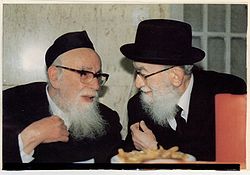Shlomo Zalman Auerbach
Rabbi Shlomo Zalman Auerbach שלמה זלמן אויערבאך | |
|---|---|
 Shlomo Zalman Auerbach (left) with Gedaliah Eiseman (1989) | |
| Personal life | |
| Born | July 20, 1910 |
| Died | February 20, 1995 (aged 84) |
| Spouse | Chaya Rivka Ruchamkin[1] |
| Children | Shmuel Ezriel Avraham Dov (died 2021) Mordechai Yaakov Auerbach Meir Simcha Baruch Rachel (married Zalman Nechemia Goldberg) |
| Religious life | |
| Religion | Judaism |
| Denomination | Orthodox |
| Position | Rosh Yeshiva |
| Yeshiva | Kol Torah |
Shlomo Zalman Auerbach (Hebrew: שלמה זלמן אויערבאך; July 20, 1910 – February 20, 1995) was an Orthodox Jewish rabbi, posek, and rosh yeshiva of the Kol Torah yeshiva in Jerusalem. The Jerusalem neighborhood Ramat Shlomo is named after Auerbach.[2]
Biography
[edit]Auerbach was the first child to be born in the Sha'arei Hesed neighborhood of Jerusalem founded by his maternal grandfather, Shlomo Zalman Porush, after whom he was named.[1] His father, Chaim Yehuda Leib Auerbach, was rosh yeshiva of Shaar Hashamayim Yeshiva, and his mother was named Tzivia.
Following his marriage, he studied under Zvi Pesach Frank at Kollel Kerem Tzion.[citation needed]
His first major published work, Meorei Esh, was the first ever written on the subject of using electricity on Shabbat.[citation needed]
He was the brother-in-law of Rabbi Sholom Schwadron, who married his sister Leah.[3]
Auerbach died on February 20, 1995.[4] An estimated 300,000 - 500,000 people attended his funeral in 1995. He was interred on Har HaMenuchot.
Auerbach had seven sons, including rabbis Shmuel Auerbach and Ezriel Auerbach, and three daughters, one of whom was married to Zalman Nechemia Goldberg.
Students
[edit]Rabbis who were his students include:
- Zalman Nechemia Goldberg, his son-in-law.
- Meir Kessler
- Avigdor Nebenzahl
- Yehoshua Neuwirth
Works
[edit]
Sefarim written by Auerbach include:
- Meorei Eish, a pioneering work concerning electricity in halacha, (1935)
- Ma'adanei Eretz, a two-volume book regarding agricultural halacha, (1946)
- Minchas Shlomo (responsa), first volume (1986), second volume (2003)
- Minchas Shlomo, a commentary on the Talmud
He also authored a commentary on Shev Shema'tata.
His rulings on medical matters and halacha were summarized and publicized by Yehoshua Neuwirth in his book Shemirat Shabbat Kehilchatah, Abraham S. Abraham in his Nishmat Avraham, and Avraham Steinberg in his Encyclopedia Hilchatit Refuit.[5]
See also
[edit]References
[edit]- ^ a b Sofer, D. "Rav Shlomo Zalman Auerbach zt"l". Yated Ne'eman (United States). Archived from the original on 31 July 2010. Retrieved 19 December 2010.
- ^ "Ramat Shlomo". Jerusalem Municipality. Retrieved 2018-02-25.
- ^ "Rav Yitzchok Hakohein Schwadron zt"l | Matzav.com". Matzav.com. 12 April 2020. Retrieved 7 February 2023.
- ^ Avraham Steinberg (January 1997). "Medical-Halachic decisions of Rabbi Shlomo Zalman Auerbach (1910-1995)". Assia, Jewish Medical Ethics. 3 (1): 30–43. PMID 11656725.
- ^ Steinberg, Avraham (2008). "Medical-Halachic Decisions of Rabbi Shlomo Zalman Auerbach". The Foundation Stone. Archived from the original on 18 February 2011. Retrieved 2 January 2011.


 French
French Deutsch
Deutsch